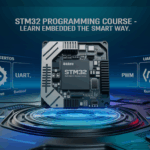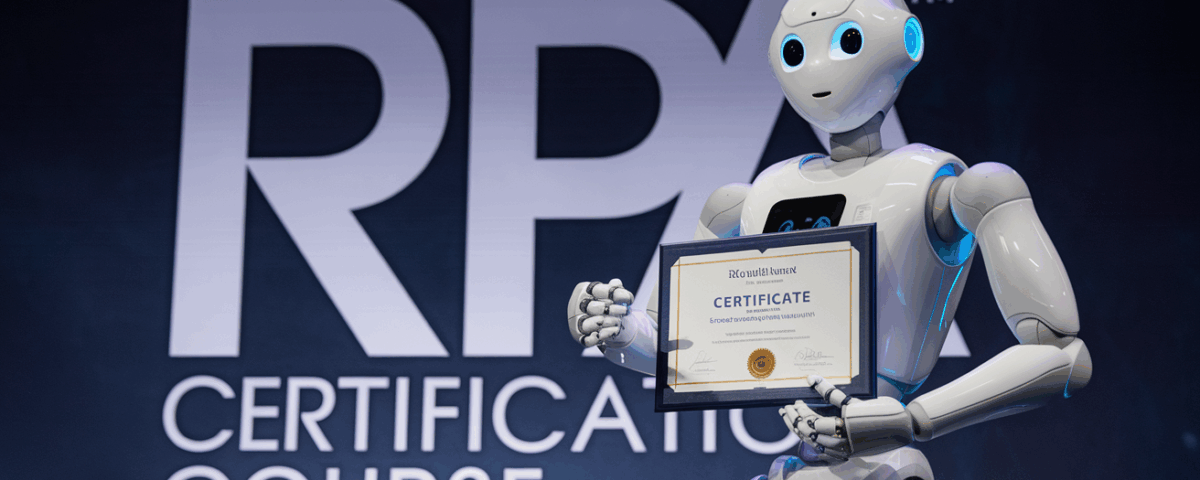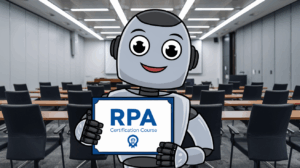
IoT Training Course on Wireless Systems, Cloud Platforms, and Emerging Technologies
June 25, 2025
STM32 Programming Course: From Basics to Advanced Real-Time Systems
June 30, 2025In the modern digital era, industries are rapidly evolving through the adoption of advanced technologies that drive efficiency and innovation. One of the most significant shifts has been the integration of automation into daily business operations. As organizations seek to improve productivity and reduce operational bottlenecks, Robotic Process Automation (RPA) has emerged as a transformative solution. It enables the automation of repetitive tasks, allowing human resources to focus on more strategic functions.
Robotic Process Automation is not just a trend but a long-term strategy that businesses are using to stay competitive in a technology-driven economy. By implementing RPA, companies achieve faster processing times, increased accuracy, and improved compliance. This widespread adoption has led to a surge in demand for qualified professionals who understand automation tools, processes, and deployment strategies.
Enrolling in a comprehensive RPA Certification Course is now one of the most effective ways for aspiring professionals to gain the knowledge and credibility required in this field. These courses offer structured learning paths that cover both conceptual foundations and applied techniques, making them ideal for students, fresh graduates, and working professionals. With recognized certification, individuals position themselves for rewarding careers in automation and digital transformation.
Table of Contents
Understanding the RPA Certification Course
A RPA Certification Course is a training program focused on Robotic Process Automation tools and technologies. These courses are structured to provide a solid understanding of how software robots can perform repetitive business tasks by mimicking human actions within digital environments.
By taking up a RPA Certification Course, learners become familiar with automation logic, task automation design, and implementation strategies using leading platforms such as UiPath, Automation Anywhere, and Blue Prism. This kind of training is especially useful for those who want to become RPA developers, solution architects, or process designers.
Who Should Take an RPA Certification Course?
This course is suitable for:
- Engineering students
- IT professionals seeking a career shift
- Business analysts
- Process managers
- Fresh graduates interested in automation technologies
For those specifically searching for a RPA course for beginners, this curriculum provides the conceptual clarity and practical implementation techniques necessary to succeed.
Modules Covered in RPA Certification Course Training
A well-organized RPA Certification Course provides learners with both foundational knowledge and real-world application skills in Robotic Process Automation. Each module is structured to cover a critical area of RPA, preparing students for a professional role in automation.
Introduction to RPA and Its Impact on Businesses
The course begins by explaining what RPA is and how it is transforming industries. Students learn about the history of RPA, its evolution, and how businesses are using automation to reduce manual workload, increase productivity, and enhance process efficiency.
Designing Automated Workflows
This section covers the fundamentals of workflow design. Learners are guided through the logic of process automation and how to model business processes into workflows using visual components and task sequences.
Working with RPA Tools like UiPath
One of the key segments of the course focuses on teaching students how to use leading RPA tools such as UiPath. This module introduces the software interface, activities library, and drag-and-drop functionalities that simplify the automation process.
Automation of Repetitive Business Processes
The next component involves learning how to automate common, rule-based tasks such as data entry, file handling, and email processing. Students explore various real-world scenarios where automation brings measurable business value.
Real-Time Case Studies and Simulations
Through case studies and simulated projects, learners get exposure to automation challenges faced by actual companies. This helps them apply their learning in a realistic context and gain confidence in process automation.
RPA Implementation Lifecycle
Understanding the stages of RPA implementation is critical for deployment. This section introduces the complete lifecycle—from planning and analysis to development, testing, deployment, and maintenance—ensuring that learners can manage projects effectively.
Error Handling and Exception Management
Students are taught how to manage unexpected conditions within workflows. This includes designing bots that can detect and respond to runtime errors, ensuring business continuity and process resilience.
Introduction to Bots and Process Orchestration
This module delves into the architecture of bots—how they are created, deployed, and managed. It also covers orchestrators, which control and monitor bots across different environments for better scalability and visibility.
Testing and Deployment Strategies
Before going live, automation scripts must be tested thoroughly. In this section, learners understand various testing techniques, validation processes, and deployment methods that ensure error-free bot operation in a production environment.
Industry Use-Cases and Best Practices
To ensure industry readiness, the course introduces multiple domain-specific RPA use-cases. Students study examples from sectors such as banking, healthcare, retail, and telecom. Best practices in bot development, governance, and compliance are also emphasized.
Final Note on Curriculum Value
A strong RPA Certification Course is defined by the depth and relevance of its curriculum. If you’re searching for a RPA certification course near me, choose one that integrates both theoretical concepts and real-time application. A program that includes all the above elements will prepare you for success in the ever-growing field of automation.
Industry-Recognized Certification for Career Credibility
One of the key benefits of enrolling in a RPA Certification Course is the value of holding a recognized credential. Certification serves as formal validation of your skills and knowledge in Robotic Process Automation, enhancing your credibility with potential employers. It demonstrates your commitment to learning and positions you as a qualified professional in the automation domain.
Access to Career Opportunities in Automation
Completing a RPA Certification Course opens the door to a wide range of career opportunities. With the growing adoption of RPA across industries, there is a rising need for skilled automation professionals in roles such as RPA developer, process analyst, and implementation specialist. Certified individuals are more likely to be shortlisted for interviews and preferred by recruiters.
Exposure to Real-World Projects and Career Support
The course often includes real-world projects that simulate actual industry challenges, helping learners apply what they’ve studied in practical environments. In addition to technical training, many programs offer career support, including interview preparation and guidance on resume building. This combination equips students and professionals with both the skills and the confidence to succeed.
Professional Growth in Digital Technology
As businesses transition toward automation, individuals with RPA skills will continue to be in high demand. A RPA Certification Course prepares you not only for immediate job roles but also for long-term growth in digital technology careers. Whether you’re starting out or upskilling, this course strengthens your foundation for a future in tech.
Value of an Industry-Oriented RPA Course
An Industry-Oriented RPA Course focuses on the practical application of RPA tools in real business scenarios. Rather than just covering tool features, such programs emphasize how RPA fits into enterprise workflows across various sectors. This real-world perspective ensures that learners are not only skilled in automation but also understand how to use those skills effectively in professional environments.
Career Opportunities After Completing a RPA Certification Course
Professionals who complete a RPA Certification Course can pursue several high-demand roles, including:
- RPA Developer
- RPA Business Analyst
- Process Designer
- RPA Solution Architect
- Automation Tester
- Implementation Manager
The demand for these roles is growing across sectors such as banking, healthcare, insurance, telecom, logistics, and retail.
The Role of RPA in Business Transformation
Robotic Process Automation (RPA) is playing a pivotal role in transforming how modern businesses operate. By automating repetitive and rule-based tasks, companies are able to significantly reduce manual intervention and enhance operational efficiency. This shift not only accelerates processes but also creates room for employees to focus on more strategic, high-value activities.
Operational Benefits of RPA Implementation
The implementation of RPA technology brings a wide range of business advantages. It reduces the likelihood of human error, improves processing speed, and ensures consistency in task execution. Businesses also experience enhanced data accuracy and improved compliance with regulatory standards due to the traceable and auditable nature of automated workflows. Additionally, automation helps in lowering operational costs by reducing the reliance on manual labor for routine tasks.
Growing Demand for RPA-Certified Professionals
Because of the measurable impact RPA has on business performance, companies are increasingly looking for professionals who can implement and manage automation solutions. As a result, the demand for individuals who have completed a recognized RPA Certification Course in India is rapidly rising. Employers prefer candidates who have undergone formal training and are equipped to contribute to automation projects from day one, making certification a valuable career asset.
How to Choose the Right RPA Certification Course
With the rise of automation across industries, enrolling in a RPA Certification Course has become a valuable step for students and professionals aiming to stay relevant in today’s job market. However, not all courses offer the same quality or career outcomes. Choosing the right program is essential to ensure you gain both the technical skills and practical insights needed for real-world success.
When searching for a RPA certification course near me, consider the following factors:
- Course content alignment with industry needs
- Certification validity and recognition
- Faculty experience
- Placement support
- Real-time application of automation concepts
- Tool coverage (e.g., UiPath, Blue Prism)
An ideal course combines technical modules with practical application, making it an Industry-Oriented RPA Course.
RPA Course with Placement Assistance
Importance of Post-Training Support
Placement-Oriented Training Approach
Our RPA Certification Course is designed not just to teach automation tools and techniques, but also to prepare students for real-world job opportunities. The course includes structured placement support such as resume development sessions, aptitude training, and soft skills enhancement to build confidence during interviews.
Mock Interviews and Career Counseling
To improve students’ chances of securing desirable roles, we conduct regular mock interviews that simulate real hiring scenarios. Our career counselors offer one-on-one feedback to help learners refine their responses and presentation.
Industry Connections and Hiring Referrals
We maintain strong connections with hiring partners, including top MNCs and RPA-focused consulting firms. Our placement team regularly shares job opportunities and refers certified candidates directly to recruiters. This network enhances the employment prospects for our students.
Trusted Choice for Career-Oriented Learners
Because of our commitment to post-training success, Elysium Embedded School is widely recognized as a reliable destination for those seeking a RPA Course with Placement Assistance. Many of our alumni have successfully transitioned into roles in automation and continue to build successful careers in the industry.
RPA Adoption is Growing Rapidly in India
India is witnessing a rapid transformation in how businesses operate, driven by a strong focus on digitalization and automation. Robotic Process Automation (RPA) is at the forefront of this shift, helping enterprises streamline repetitive tasks and increase efficiency. As a result, RPA is no longer confined to large corporations—it is being widely adopted by small and mid-sized companies across various sectors including banking, healthcare, logistics, and retail.
Rising Demand for Skilled RPA Professionals
The rise in RPA implementation has created a strong demand for skilled professionals who can develop, deploy, and manage automation processes. Indian companies are actively hiring certified RPA developers, business analysts, and automation testers to meet the growing workload of automation projects. This rising demand has made it essential for job seekers to pursue a structured RPA Certification Course in India to gain the technical and practical skills that industries expect.
Career Advantage Through Certified RPA Training
Enrolling in a recognized RPA Certification Course enables Indian students and professionals to build competitive profiles in the global job market. Certification serves as proof of expertise and signals to employers that a candidate is trained in both tools and best practices. With India positioned as a global hub for IT and automation talent, a quality RPA course can open doors to high-paying job opportunities both domestically and abroad.
Why Choose Elysium Embedded School for Your RPA Certification Course?
Industry-Recognized RPA Certification Program
Elysium Embedded School offers a well-structured and industry-relevant RPA Certification Course that meets the current demands of automation and digital transformation. Our curriculum is crafted in consultation with industry experts to ensure learners gain practical and applicable knowledge in Robotic Process Automation.
Experienced Faculty with Industrial Exposure
Our course is delivered by expert trainers who bring years of industrial experience in automation and software development. Their real-world insights help students understand the challenges and expectations of automation roles in today’s job market.
Curriculum Aligned to Industry Expectations
The RPA Certification Course covers essential topics, tools, and use-cases that are directly relevant to enterprise automation needs. From understanding automation logic to working on tools like UiPath, the program is structured to build both conceptual understanding and operational skills.
Real-World Projects and Application-Focused Training
To ensure learners are prepared for job responsibilities, our course includes automation projects based on real-world scenarios. This gives students the opportunity to apply their learning to business-relevant tasks, helping them understand the functional role of RPA in various industries.
Career Preparation and Placement Assistance
Beyond technical training, we provide professional development support that includes resume preparation, mock interviews, and placement referrals. Our dedicated placement support team works to connect students with opportunities that match their skill set and aspirations.
Suitable for Beginners and Professionals
Whether you are a final-year student, recent graduate, or a working professional seeking to shift into automation, our RPA course for beginners and experienced learners alike is designed to meet diverse career objectives. The program accommodates learners from both technical and non-technical backgrounds.
FAQ
- Is prior programming knowledge required for the RPA Certification Course?
No, the RPA Certification Course is designed in a beginner-friendly manner. While basic understanding of programming is helpful, it’s not mandatory.
- What tools are covered in the Elysium Embedded School RPA Certification Course?
The course covers popular RPA tools such as UiPath, Blue Prism, and Automation Anywhere, equipping students to work across multiple platforms.
- Can I enroll in this RPA course for beginners without any technical background?
Yes, our RPA Certification Course is designed to suit both technical and non-technical learners. It starts from the basics and gradually builds up.
- How long is the RPA Certification Course at Elysium Embedded School?
The duration typically ranges from 6 to 8 weeks, depending on the batch type. We offer both weekday and weekend options for flexibility.
- Does the RPA Certification Course include job placement support?
Yes, our RPA Course with Placement Assistance includes resume building, mock interviews, and placement drives with reputed companies.
Conclusion:
If you’re aiming to advance your career and stay relevant in today’s automation-driven job market, enrolling in a RPA Certification Course is a strategic decision. The growing adoption of Robotic Process Automation across industries has created vast opportunities for professionals who possess the right technical knowledge and process-oriented thinking.
At Elysium Embedded School, our RPA Certification Course is specifically designed to meet the expectations of modern industries. From conceptual learning to practical application, every aspect of the program is tailored to ensure students are ready to take on real-world challenges. With our structured curriculum, experienced trainers, and placement-focused approach, we guide learners throughout their professional journey—from training to employment.
For those seeking reliable, industry-aligned training with clear career pathways, Elysium Embedded School offers the ideal platform. Take your first step toward a rewarding future in Robotic Process Automation. Join our RPA Certification Course today—where your skills meet real-world opportunity.







